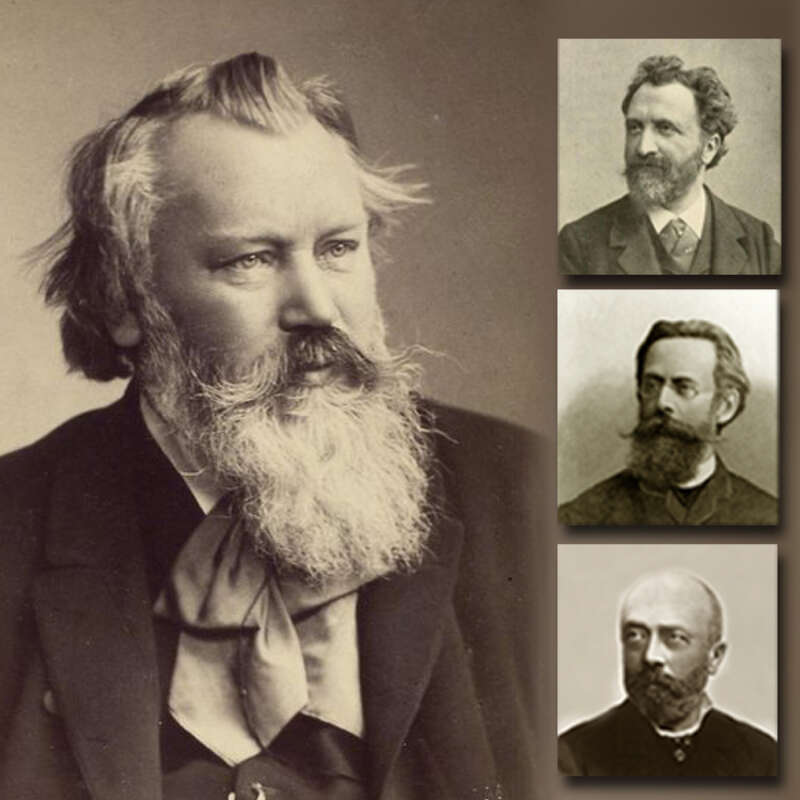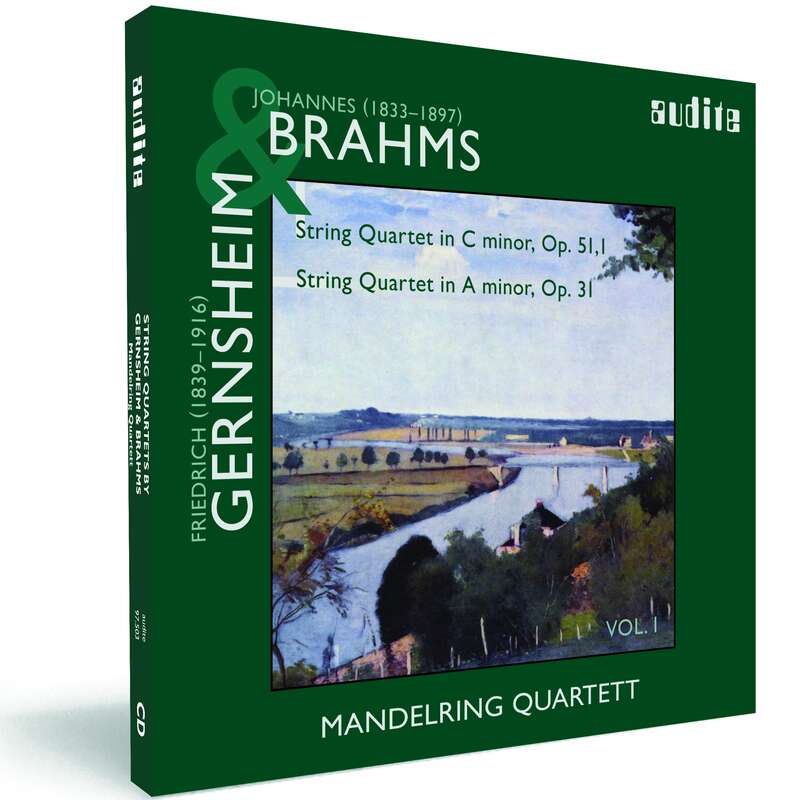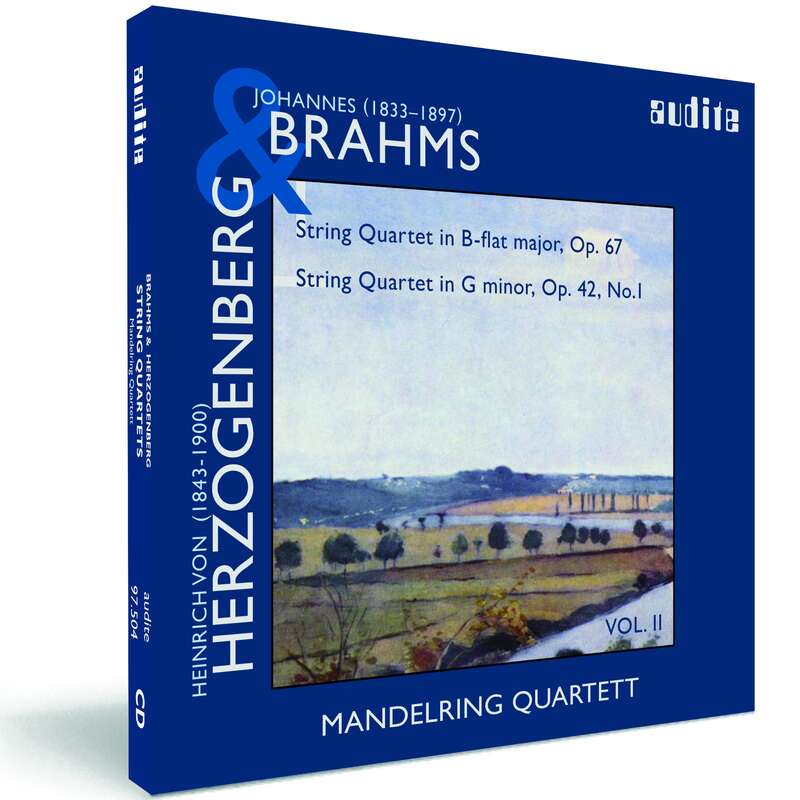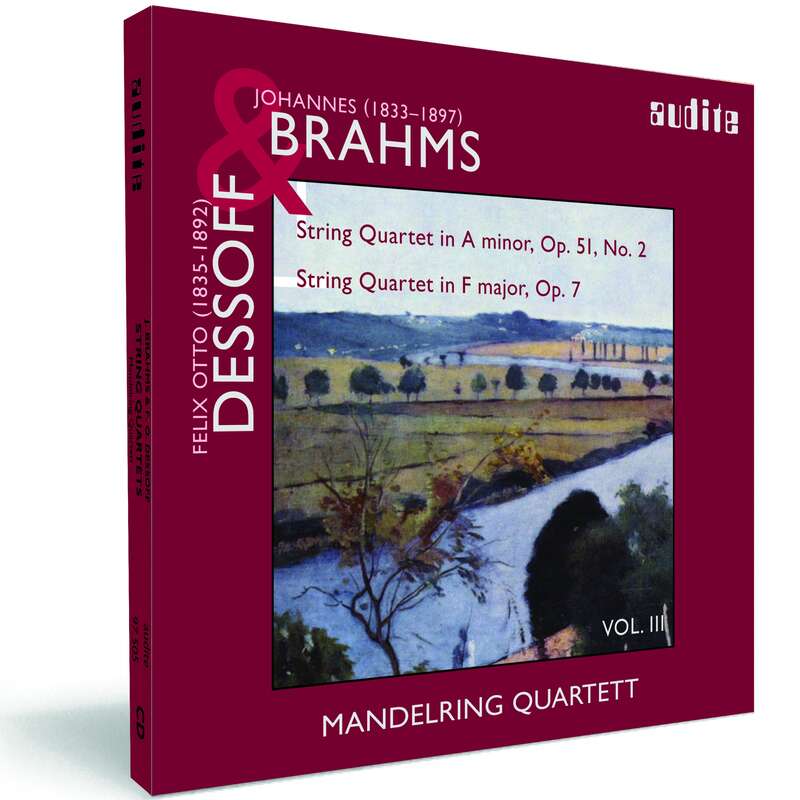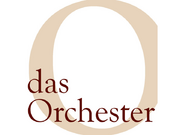This edition compares and contrasts string quartets of Johannes Brahms and his contemporaries Friedrich Gernsheim, Heinrich von Herzogenberg and Felix Otto Dessoff on three CDs. There were close contacts as well as looser ones between Brahms and the other composers, and musical references to Brahmsmore
"The gifted Mandelring Quartet play this delightful work with such unfailing sensitivity and enraptured affection (not to say technical aplomb) that you’d have thought it was central repertoire they’d been playing for years." (The Strad)
Track List
Informationen
This edition compares and contrasts string quartets of Johannes Brahms and his contemporaries Friedrich Gernsheim, Heinrich von Herzogenberg and Felix Otto Dessoff on three CDs. There were close contacts as well as looser ones between Brahms and the other composers, and musical references to Brahms in the works of his contemporaries cannot be denied. Nonetheless, their string quartets bear witness to an individual treatment of this demanding genre and Gernsheim, Herzogenberg and Dessoff confront the Brahms string quartets with independent compositions thoroughly equal in value. Herzogenberg's String Quartet in G minor, Op. 42/1 is presented by audite as a world premiere recording.
Reviews
classiqueinfo-disque.com | mardi 9 décembre 2008 | Vincent Haegele | December 9, 2008 Brahms et quelques consorts
Brahms n’a pas été un compositeur de quatuors à cordes commeMehr lesen
classiqueinfo-disque.com | mardi 9 décembre 2008 | Vincent Haegele | December 9, 2008 Brahms et quelques consorts
Brahms n’a pas été un compositeur de quatuors à cordes commeMehr lesen
classiqueinfo-disque.com | mardi 9 décembre 2008 | Vincent Haegele | December 9, 2008 Brahms et quelques consorts
Brahms n’a pas été un compositeur de quatuors à cordes commeMehr lesen
Das Orchester | 9/2008 | Georg Rudiger | September 1, 2008
Bis vor einigen Jahren war Friedrich Gernsheim nur MusikwissenschaftlernMehr lesen
American Record Guide | September/October 2008 | Bender | September 1, 2008
Both of these albums are devoted to the chamber music of Brahms (1833-97) and his contemporaries, and some readers may be surprised to see RichardMehr lesen
Heinrich von Herzogenberg (1843-1900) very much belonged to the Brahms circle. But he was reluctant to move on. The two works here – as with other of his music, but perhaps not the church music he devoted himself to more and more as he grew older – are instantly recognizable as Brahmsian. So history has done its best to forget them. That is too bad, because, especially if you favor idea over style, they are really lovely works. There is real expert mastery of the cello sonata and string quartet forms; they are melodically distinguished, and adroit in their avoidance of romantic excess. I am glad to add them my library.
If the film industry ever goes back to the kind of romantic drama favored before World War II, the triangle between Brahms and Herzogenberg and the latter's wife, Elisabeth, would make a fascinating movie. Matt Damon could star as Herzogenberg, Julia Roberts as Elisabeth, and Paul Giamatti as Brahms. Elisabeth was charming and musically talented and apparently a bit of a maneuverer; she regularly did her best to interest Brahms in her husband's music. Brahms, a confirmed bachelor, doted on her and did his best to comply, but seems to have been steadily growing weary of having Herzogenberg at his feet. Heinrich might have been better off for his career taking Elisabeth and moving elsewhere. He did eventually move to Berlin with her.
Meanwhile, the older composer was rolling on musically. In Germany's Mandelring Quartet he has an exciting new champion. It consists of the violist Roland Glassi and three Schmidts – Sebastian and Nanette on violins and Bernhard on cello. One has to assume the Schmidts are related; Audite is silent on the subject. The players are very good. The performance of Brahms's third and last quartet, in B-flat, Op. 67, is one of the finest to come along in years.
The Mandelring's Brahms benefits from judicious tempos, an imaginative dynamic range, clear textures, and careful blending. The performance of the Andante (II) is wonderfully expressive and secure in the way it captures the long lines of Brahms's writing. In the variations of IV the group displays a kaleidoscope of colors that they seem to use to help shape the phrasing. Their performance of the Herzogenberg quartet is filled with the kind of energy and belief that seems to say, "we delight in the discovery of this work".
Moser has won assorted prizes, and his resume lists performances with orchestras in the US, Britain, and Europe. Judging by this release, he plays excellently and with understanding. So does Rivinius, who gets one picture in the album as opposed to five dreamy poses accorded the cellist, who also offers a lofty interview rather pretentiously tided "The Sum of the Universe", Brahms apparently being the universe. Brahms's First Cello Sonata is a beautiful piece with an outstanding last movement that Moser and Rivinius set forth with flair, taste, and imagination. It is also nice to hear them plunge into that world-being-born inside Strauss's mind, and to note how they give equal attention to his small debts to Mendelssohn, Schumann, and Brahms, yet give rapt attention to Strauss's own genius, which would keep him moving on until half-way through the next century.
Fanfare | Issue 31:5 (May/June 2008) | Jerry Dubins | May 1, 2008
This is one of the other two companion discs mentioned in my review of Audite 97505 elsewhere. On three separate CDs—this one being Volume 2—theMehr lesen
On the present disc is a string quartet by Heinrich von Herzogenberg (1843–1900), an individual who enjoyed a special status within the Brahms circle, but for reasons other than his musical endowments. Elisabet von Stockhausen had been a piano pupil of Brahms, and she was to become possibly his most passionate love fixation, more so even than Clara Schumann. The letters they exchanged—some 250 of them—are filled with Brahms’s thinly veiled amorous yearnings.
Until 1868 marriage looked like it might be in the cards, but for reasons still not clear—cold feet?—Brahms broke off the relationship, and Elisabet married—guess who?—Heinrich von Herzogenberg. On one level, Brahms must have felt relieved, for he was now free to resume a Platonic relationship with Elisabet for whom he still had strong feelings. Being human, however, Brahms must have felt pangs of anger, betrayal, jealousy, and envy; yet in order to maintain good relations with Elisabet he had to suppress such feelings and remain civil, if not gracious, to the man who stole his sweetheart. To complicate matters further, Heinrich grew ever more idolatrous of Brahms, seeking his advice and mentorship, and attempting to mimic the elder composer’s style, all the while apparently oblivious to or unconcerned by Elisabet’s and Brahms’s relationship.
Of the many composers that circulated in Brahms’s sphere, Herzogenberg may have tried the hardest, without entirely succeeding, to imitate Brahms’s style. In a review of his solo piano works, (30:3) I wrote, “Unmistakably, this music was incubated in the Brahms-Schumann nursery, but just as unmistakably, it does not quite resemble either parent. Not as emotionally charged or lyrically expressive as Schumann, and not as introspective, psychologically complex, or harmonically and rhythmically advanced as Brahms, Herzogenberg seems nonetheless to have forged a derivative style based on his models, yet one that manages to avoid slavish aping.” And as far back as 25:2, Raymond Tuttle wrote of Herzogenberg’s E-Minor Piano Quartet, “From the opening notes, a Brahmsian wave washed over me...”.
Herzogenberg’s 1883 G-Minor String Quartet (the first of a set of three he wrote under the op. 42) is unabashedly Brahmsian. I would not argue with Tuttle on that point. I would not go so far as to say, however, that Herzogenberg was so determined a copyist—or strove to be—that his work could pass for the real McCoy. Brahms may have been the most imitated of all composers, yet his music resists exact imitation. One of the keys to understanding this is the subtle and secret art of “continuation.” The rules of harmony and counterpoint can be taught and learned. The gift of melody is, well, a gift. But having stated a musical idea, what follows it, what comes next, and why it takes your breath away or doesn’t is one of music’s enduring mysteries.
When you listen to the Brahms B♭ Quartet on this disc, you will hear a minimum of musical material that coalesces and expands into ever widening arcs. One by one, these jigsaw puzzle pieces fit together to form a work that satisfies on a deeper, subconscious level as a result of its organizational principles and structure.
Now listen to the Herzogenberg. Does it sound like Brahms? On the surface, yes, pretty much it does. But try listening below the surface, and what you are likely to discover is that it lacks the coherence and cohesion of the Brahms. On the surface, it’s a beautiful thing. Underneath, its progression of ideas is felt more than heard to be weak in the continuation that gives Brahms such underlying strength.
Audite is to be applauded for contrasting works by Brahms with those of his contemporaries and friends on the same discs; for in this way we can hear for ourselves the differences, sometimes subtle, other times not, between these composers that were drawn in by and circled like lesser satellites around the most influential composer of the late 19th century.
I am more positively disposed towards the Mandelring’s reading of Brahms’s B♭-Major Quartet on this volume than I was towards their less energized interpretation of the A-Minor Quartet on Volume 3. The B♭-Major is an altogether less intense, less tightly wound work, and the Mandelring’s more easygoing manner suits it perfectly. Listen to their amiable way with the last movement. If your interest is strictly in the Brahms, however, I’d still put my money on the Emerson Quartet.
As for the Herzogenberg, there don’t seem to be any alternative versions to choose from at the moment, which is all the more reason to be grateful for the Mandelring’s recording, which is excellent in all respects. Recommended.
Fanfare | Issue 31:5 (May/June 2008) | Jerry Dubins | May 1, 2008
Though the Brahms quartet leads off the program here, it’s the quartet by Felix Otto Dessoff (1835–1892) that’s the more noteworthy item. As youMehr lesen
Audite and the Mandelring Quartet (Sebastian Schmidt and Nanette Schmidt, violins; Michael Scheitzbach, viola; and Bernhard Schmidt, cello) have released two companion discs to this one, pairing each of Brahms’s other two string quartets with a quartet by a near contemporary. Brahms’s C-Minor Quartet is paired with a quartet by Friedrich Gernsheim, and the B♭-Major Quartet is paired with a quartet by Heinrich von Herzogenberg.
My previous encounter with the Mandelring came with four cpo CDs of chamber music by Georges Onslow, in which repertoire I thought they were quite good. The field for Brahms’s quartets, however, is far more crowded; and the present release does not have timing on its side, having arrived not long after the Brahms set with the Emerson Quartet. While the A-Minor Quartet is not as tightly wound and aggressive as its sibling C-Minor Quartet, there is still a nervous unease to it that the Mandelring’s more laid-back reading seems to miss. The playing is beautiful, but it’s a bit too relaxed for my taste and lacking the edginess that the Emerson brings to the score.
For the Dessoff, choice is extremely limited, the current recording being the only one listed. Experience has taught me, however, to make a more thorough check before declaring a recording to be the first or only one in existence. And sure enough, a quick perusal of my own collection turned up a 1983 Antes CD (319023) of the piece played by the Bartók Quartet. It has the advantage of being coupled with a 1986 performance of Dessoff’s even more rarely heard 1880 G-Major String Quintet. In a case of reverse influence, it may be that Brahms’s own two string quintets may have been inspired by Dessoff’s earlier written work, though Brahms chose to follow Mozart’s model with two violas, while Dessoff chose Schubert’s model with two cellos. Whether the Antes disc is still available or not, I can’t say.
Dessoff’s F-Major Quartet could not be mistaken for Brahms, no how, no way. The harmonic language is similar, but the melodic profile doesn’t match, the texture is lighter, and the overall mood is gay—more reminiscent of Johann Strauss’s Vienna than Brahms’s. Listen, for example, to the Poco andantino that serves as the quartet’s Scherzo movement. Most delightful is the last movement, Allegro con brio, a joyous, jocular affair that dashes breathlessly here and there like a busy aunt arranging the table decorations and everything else for a wedding reception. It’s a lightweight, playful piece that makes a fine foil to Brahms’s much darker and heavy-hearted work.
Playing and recording are excellent. Recommended.
American Record Guide | May/June 2008 | Fine | May 1, 2008
You will be relieved to see your name on the title page of the quartet preserved for posterity. When people have forgotten your German Requiem, peopleMehr lesen
The above quotation is from Felix Otto Dessoff (1835-1892), who is best known as the conductor who led the first performance of Brahms's First Symphony. Dessoff was an excellent composer who wrote only a small amount of music. It seems that he stopped composing when his conducting career demanded all of his time. He dedicated his only string quartet to Brahms, with whom he had a close friendship. He uses harmonic language that is similar to the Brahms but uses it differently. This is not a work that copies Brahms, but it shows similar influences. One influence makes itself very clear: II bears homage to II of Beethoven's Opus 59:3 (Quartet 9).
It is a shame that Dessoff only wrote one string quartet, but this is a real gem, and it holds its own next to Brahms. I find it more enjoyable to listen to than the intense Brahms A-minor (No. 2). This is part of an eye-and-ear-opening set of recordings by the Mandelring Quartet that pair Brahms's three quartets with quartets by three of his close friends. The playing by this quartet, that has siblings as three of its members, is excellent.
CD Compact | Número 218, Marzo 2008 | Emili Blasco | March 1, 2008
Audite presenta dos discos con el Cuarteto Manderling como protagonistaMehr lesen
CD Compact | Número 218, Marzo 2008 | Emili Blasco | March 1, 2008
Audite presenta dos discos con el Cuarteto Manderling como protagonistaMehr lesen
www.musicweb-international.com | February 2008 | Jens F. Laurson | February 25, 2008
Worth a strong recommendation for Brahms A minor alone and the Dessoff is immediately and lastingly enjoyable ...<br /> <br /> I am, reluctantly, convinced ofMehr lesen
I am, reluctantly, convinced of the merits of the Brahms String Quartet in A minor op.51, no.2. I just have yet to be touched, charmed or moved by it. I’ve tried to let the Emerson and the Takács Quartets do that for me, but they only offered excellence, not grit or inescapable passion. Three’s a charm though, and the third recording of the A minor quartet I’ve come across this year may have done it for me.
When Brahms develops a 35 minute quartet out of just a few basic musical building blocks, the result is - or can be - an expressive stringency of which Hugo Wolf declared Brahms the “undisputed master of composing without ideas”. Even Britten quipped that it wasn’t bad Brahms that he minded, but good Brahms that he couldn’t stand.
Usually I’d snicker with delighted, if embarrassed agreement – at least where Brahms’ string quartets are concerned. But the combination of cohesion and energy of the Mandelring Quartett (who played Brahms at the Library of Congress in 2006) makes for an unusually compelling, indeed spellbinding performance. Brahms, for once, seems successfully to reach the pinnacle of a composer’s ambition that is the string quartet with op.51/2. This is a string quartet that fascinated Schoenberg for its economy of means and made him famously declare Brahms ‘a progressive’. I will have to explore the other two volumes of their Brahms traversal – made only more attractive by their inclusion of string quartets of (forgotten) contemporaries of Brahms. If ever issued as a set – hopefully retaining the ‘fillers’ – it might well vie for the reference recording spot with the Alban Berg Quartet’s EMI recording.
This disc is worth a strong recommendation for the Brahms A minor alone. But there is more. Rather than point out that the ‘filler’ on the Brahms is “this neat, unknown F.O. Dessoff”, the performance and the quartet deserve to be mentioned, praised, and recommended separately. In fact, I’d give this disc the same two thumbs up even if it only included either of the two quartets.
That’s not only because the playing is outstanding but also because Dessoff’s op.7 is much more than just an afterthought to the Brahms quartet. It’s a wonderful work that deserves to be smack-dab in the middle of the string quartet repertoire of more groups than just the Mandelring. Brahms himself, a friend of Dessoff’s, found to have “such an unassuming face that one hardly dare praise it out loud … It would greatly please me to have my name printed on the front page of this quartet that is amiable smiling at me …”.
Holger Best’s liner-notes mention that Dessoff did not want to sully his reputation as a great performer with a second-rate composition. He need not have worried in this case. The F major quartet smiles amiably, indeed. All four movements are ear-catching, a joy to listen to, unpretentious, simple but not simplistic, full of joy but not silly.
What makes it so immediately and lastingly enjoyable is perhaps that skilled but still not so very seriously well crafted Brahms element in it, or the fact that it is perfectly romantic without being burdened with dreamy portentousness - Schumann, some may say.
The delicate pizzicato theme running through the opening Larghetto merges with beautiful lyrical lines for an exquisite slow movement. The Poco andantino has Viennese café-house mood and gaiety running through its veins … and that from a cool northern German! The outer movements, a driving Allegro ben moderato and a busy Allegro con brio have less of a personal touch to them but are more than adequate opening and closing statements. What else did this Dessoff compose?
Quite why it took nine years for this disc to be released I do not know.
I am, reluctantly, convinced of
Ensemble - Magazin für Kammermusik | 1/2008 - Februar/März | Helmut Peters | February 1, 2008 Brahms und Freunde
Die Freundschaft zwischen Mann und Frau, spekulierte der französischeMehr lesen
Classical Weta 90,9 FM - Classical for Washington | Tuesday, 3.1.08, 5:02 pm | Jens F. Laurson | January 3, 2008
These Are a Few of My Favorite Things - 2007, Part XIII<br /> <br /> 2007 won’t seeMehr lesen
2007 won’t see
Classical Weta 90,9 FM - Classical for Washington | Tuesday, 1.1.08, 1:01 am | Jens F. Laurson | January 1, 2008
These Are a Few of My Favorite Things - 2007, Part XII<br /> <br /> 2007 won’t seeMehr lesen
2007 won’t see
Muzyka21 | 1 (90) – styczeń 2008 | Stanisław Lubliński | January 1, 2008
Prezentowane trzy nagrania stanowiące jeden cykl powinny mieæ wspólnyMehr lesen
Muzyka21 | 1 (90) – styczeń 2008 | Stanisław Lubliński | January 1, 2008
Prezentowane trzy nagrania stanowiące jeden cykl powinny mieæ wspólnyMehr lesen
Muzyka21 | 1 (90) – styczeń 2008 | Stanisław Lubliński | January 1, 2008
Prezentowane trzy nagrania stanowiące jeden cykl powinny mieæ wspólnyMehr lesen
Classica-Répertoire | décembre 2007-janvier 2008 | Antoine Mignon | December 1, 2007
Les Mandelring poursuivent leur exploration des quatuors à cordes deMehr lesen
Neue Musikzeitung | nmz 2007/11 | Seite 42 | 56. Jahrgang | November | Hanspeter Krellmann | November 1, 2007 Zeitgenossenschaft
Generations-Angehörige innerhalb einer Epoche bilden, auch wenn sie ohneMehr lesen
Fono Forum | 11/2007 | Marcus Stäbler | November 1, 2007 Zeitgenossen, Schüler und Lehrer
In einer verdienstvollen CD-Reihe kombiniert das Label Audite Werke von Brahms mit Ersteinspielungen von Quartetten seiner Zeitgenossen, die ihnMehr lesen
Im direkten Vergleich bleibt der Schüler indes doch ein wenig hinter dem Standard seines Lehrers zurück: Herzogenbergs g-Moll-Quartett op. 42 Nr. 1 aus dem Jahr 1883 vermag zwar insbesondere mit den rhythmischen Raffinessen im dritten Satz durchaus zu gefallen, kann jedoch mit der motivischen Dichte und dem ungleich größeren thematischen Einfallsreichtum des fünf Jahre älteren Quartetts op. 7 von Dessoff nicht mithalten, das von souveräner handwerklicher Meisterschaft zeugt.
An die Werke ihres omnipräsenten Vorbildes und Freundes Brahms können allerdings beide Komponisten nicht wirklich heranreichen. Obwohl sie seinen Modellen keinesfalls sklavisch folgen, bleibt ihnen eine vergleichbare Eigenständigkeit, melodische Prägnanz und formale Dichte doch verwehrt. Gleichwohl sind die Einspielungen als interessante und reizvolle, stellenweise sogar durchaus fesselnde Repertoire-Bereicherungen hochwillkommen – zumal sie in den Mitgliedern des Mandelring-Quartetts ebenso kompetente wie engagierte Anwälte gefunden haben, die einmal mehr das vorzügliche Niveau des Ensembles unter Beweis stellen.
Neue Musikzeitung | nmz 2007/11 | Seite 42 | 56. Jahrgang | November | Hanspeter Krellmann | November 1, 2007 Zeitgenossenschaft
Generations-Angehörige innerhalb einer Epoche bilden, auch wenn sie ohneMehr lesen
Fono Forum | 11/2007 | Marcus Stäbler | November 1, 2007 Zeitgenossen, Schüler und Lehrer
In einer verdienstvollen CD-Reihe kombiniert das Label Audite Werke von Brahms mit Ersteinspielungen von Quartetten seiner Zeitgenossen, die ihnMehr lesen
Im direkten Vergleich bleibt der Schüler indes doch ein wenig hinter dem Standard seines Lehrers zurück: Herzogenbergs g-Moll-Quartett op. 42 Nr. 1 aus dem Jahr 1883 vermag zwar insbesondere mit den rhythmischen Raffinessen im dritten Satz durchaus zu gefallen, kann jedoch mit der motivischen Dichte und dem ungleich größeren thematischen Einfallsreichtum des fünf Jahre älteren Quartetts op. 7 von Dessoff nicht mithalten, das von souveräner handwerklicher Meisterschaft zeugt.
An die Werke ihres omnipräsenten Vorbildes und Freundes Brahms können allerdings beide Komponisten nicht wirklich heranreichen. Obwohl sie seinen Modellen keinesfalls sklavisch folgen, bleibt ihnen eine vergleichbare Eigenständigkeit, melodische Prägnanz und formale Dichte doch verwehrt. Gleichwohl sind die Einspielungen als interessante und reizvolle, stellenweise sogar durchaus fesselnde Repertoire-Bereicherungen hochwillkommen – zumal sie in den Mitgliedern des Mandelring-Quartetts ebenso kompetente wie engagierte Anwälte gefunden haben, die einmal mehr das vorzügliche Niveau des Ensembles unter Beweis stellen.
Neue Musikzeitung | nmz 2007/11 | Seite 42 | 56. Jahrgang | November | Hanspeter Krellmann | November 1, 2007 Zeitgenossenschaft
Generations-Angehörige innerhalb einer Epoche bilden, auch wenn sie ohneMehr lesen
Le Monde de la Musique | Novembre 2007 | Patrick Szersnovicz | November 1, 2007
Si Brahms n'a abordé le quatuor à cordes qu'après un par-cours long et détourné, l'alchimie thématique et l'interférence des rythmes binairesMehr lesen
Excellente jeune formation allemande, le Quatuor Mandelring poursuit son intégrale en couplant chaque fois un quatuor de Brahms avec un quatuor d'un de ses contemporains. Sans éclipser les sommets de la discographie (Quatuors Juilliard. Amadeus, Alban Berg, Prazak), son interprétation du Troisième Quatuor en si bémol majeur est une fort belle réussite, où la maîtrise technique et le sens de l'architecture, assez proche de celui du Quatuor de Leipzig, se marient à une acuité intellectuelle qui s'inscrit dans une tout autre filiation – celle du Quatuor LaSalle –, a priori très éloignée de la tradition germanique. Le rythme est aussi tendu, les voix internes aussi équilibrées dans une lecture du Quatuor op 42 n° 1 de Herzogenberg qui parvient presque à réhabiliter l'œuvre.
RBB Kulturradio | Kulturrradio am Mittag | Cornelia Schönberg | October 23, 2007
Das deutsche Mandelring Quartett widmet sich seit einiger Zeit weniger gespielten Streichquartett-Werken und ermöglicht damit interessanteMehr lesen
Dessoff und Herzogenberg sind Musikerpersönlichkeiten aus dem unmittelbaren Umkreis von Brahms. Dessoff, etwa gleichaltrig, verbuchte vor allem als Dirigent große Erfolge, Brahms schätzte den Kollegen. Herzogenberg dagegen war zehn Jahre jünger und konnte als Komponist nur freundliche Zurückhaltung von Brahms ernten.
Es sind kleine, aber in der Summe wesentliche Details, die die Brahms-Quartette von den recht ähnlich klingenden Werken Dessoffs und Herzogenbergs unterscheiden. Brahms war eben doch der originellere, spannungsreichere, perfektere Komponist. Doch zu dieser Erkenntnis mischt sich beim Hören Anerkennung über die erstaunliche Qualität der unbekannten Streichquartettwerke, denen man eine häufigere Aufführung wünscht.
Das Mandelring Quartett spielt tonschön, gut ausbalanciert und mit sauberer Intonation. Der Einsatz des Ensembles ist sehr verdienstvoll, denn Brahms steht nicht einsam auf seinem Sockel in einer musikalischen Wüste: der Komponist lebte in einem genauso turbulent-vielschichtigen klanglichen Umfeld wie wir heute.
RBB Kulturradio | Kulturrradio am Mittag | Cornelia Schönberg | October 23, 2007
Das deutsche Mandelring Quartett widmet sich seit einiger Zeit weniger gespielten Streichquartett-Werken und ermöglicht damit interessanteMehr lesen
Dessoff und Herzogenberg sind Musikerpersönlichkeiten aus dem unmittelbaren Umkreis von Brahms. Dessoff, etwa gleichaltrig, verbuchte vor allem als Dirigent große Erfolge, Brahms schätzte den Kollegen. Herzogenberg dagegen war zehn Jahre jünger und konnte als Komponist nur freundliche Zurückhaltung von Brahms ernten.
Es sind kleine, aber in der Summe wesentliche Details, die die Brahms-Quartette von den recht ähnlich klingenden Werken Dessoffs und Herzogenbergs unterscheiden. Brahms war eben doch der originellere, spannungsreichere, perfektere Komponist. Doch zu dieser Erkenntnis mischt sich beim Hören Anerkennung über die erstaunliche Qualität der unbekannten Streichquartettwerke, denen man eine häufigere Aufführung wünscht.
Das Mandelring Quartett spielt tonschön, gut ausbalanciert und mit sauberer Intonation. Der Einsatz des Ensembles ist sehr verdienstvoll, denn Brahms steht nicht einsam auf seinem Sockel in einer musikalischen Wüste: der Komponist lebte in einem genauso turbulent-vielschichtigen klanglichen Umfeld wie wir heute.
Ensemble - Magazin für Kammermusik | Oktober/November 2007 | Helmut Peters | October 1, 2007 Doppelliebe
Die Serie „Brahms und Zeitgenossen“, die das Mandelring Quartett fürMehr lesen
Diverdi Magazin | N° 163 / octubre 2007 | Blas Matamoro | October 1, 2007
Brahms y el brahmsismo
Desoff y Herzogenherg, enfrentados a su gran contemporáneo hamburgués
Brahms, aparte de ser uno de los grandes, suele emblematizar al conservatismo estético. Frente a Wagner, doctrinal, revolucionario y anunciador de unMehr lesen
Hoy podemos deshacer el tópico brahmsiano. Si bien don Hans se valió de estructuras heredadas y consolidadas, no lo hizo en plan reminiscente sino añadiendo elementos inéditos, renovando el legado a su manera. Así se lo reconoció nada menos que Arnold Schönberg y al tema dedicó un minucioso y bello libro Massimo Mila. La polémica sigue abierta, pues ¿hasta qué punto no conservó la dodecafonía el semitono, la escritura pentagramática y la orquestación de toda la vida?
Estos compactos nos ofrecen un curioso y necesario paralelo entre cuartetos de Brahms y de dos "brahmsistas" contemporáneos. En el caso de Heinrich von Herzogenberg, a su devoción se une la de su mujer Elisabeth, que se escribió con Brahms unas 250 cartas de amistad encendida, ruegos y partituras dedicadas. A Brahms le atraían las mujeres de sus amigos, como Clara Schumann. Dejémonos de freudismos.
En cuanto a Félix Otto Desoff, mucho menos recordado que el anterior, se trata de un director de orquesta y pianista muy cercano a la carrera del compositor magistral. Redactando música se consideró siempre una suerte de alumno preferido. O sea que, en ambos casos, estamos ante una suerte de círculo de trabajo y afecto que redunda en el ejercicio de un lenguaje común. Ni Herzogenberg ni Desoff fueron Brahms, pero quisieron ser como él y lograron enriquecer el mundo brahmsiano. Al lado del modelo no empalidecen ni piden disculpas. Inventan, escriben, corrigen y he aquí las pruebas de una admiración estimulante.
Diverdi Magazin | N° 163 / octubre 2007 | Blas Matamoro | October 1, 2007
Brahms y el brahmsismo
Desoff y Herzogenherg, enfrentados a su gran contemporáneo hamburgués
Brahms, aparte de ser uno de los grandes, suele emblematizar al conservatismo estético. Frente a Wagner, doctrinal, revolucionario y anunciador de unMehr lesen
Hoy podemos deshacer el tópico brahmsiano. Si bien don Hans se valió de estructuras heredadas y consolidadas, no lo hizo en plan reminiscente sino añadiendo elementos inéditos, renovando el legado a su manera. Así se lo reconoció nada menos que Arnold Schönberg y al tema dedicó un minucioso y bello libro Massimo Mila. La polémica sigue abierta, pues ¿hasta qué punto no conservó la dodecafonía el semitono, la escritura pentagramática y la orquestación de toda la vida?
Estos compactos nos ofrecen un curioso y necesario paralelo entre cuartetos de Brahms y de dos "brahmsistas" contemporáneos. En el caso de Heinrich von Herzogenberg, a su devoción se une la de su mujer Elisabeth, que se escribió con Brahms unas 250 cartas de amistad encendida, ruegos y partituras dedicadas. A Brahms le atraían las mujeres de sus amigos, como Clara Schumann. Dejémonos de freudismos.
En cuanto a Félix Otto Desoff, mucho menos recordado que el anterior, se trata de un director de orquesta y pianista muy cercano a la carrera del compositor magistral. Redactando música se consideró siempre una suerte de alumno preferido. O sea que, en ambos casos, estamos ante una suerte de círculo de trabajo y afecto que redunda en el ejercicio de un lenguaje común. Ni Herzogenberg ni Desoff fueron Brahms, pero quisieron ser como él y lograron enriquecer el mundo brahmsiano. Al lado del modelo no empalidecen ni piden disculpas. Inventan, escriben, corrigen y he aquí las pruebas de una admiración estimulante.
Musica | Nr. 190 (ottobre 2007) | October 1, 2007
Heinrich von Herzogenberg fu amico di Johannes Brahms (che era più vecchioMehr lesen
klassik.com | September 2007 | Aron Sayed | September 24, 2007 | source: http://magazin.k... Auf dem Gipfel
Einzig der Bratschist des mehrfach preisgekrönten Mandelring-QuartettsMehr lesen
www.new-classics.co.uk | September 2007 | John Pitt | September 17, 2007
The German conductor and composer Felix Otto Dessoff (1835-1892) was born in Leipzig, where he studied composition (with Moritz Hauptmann and JuliusMehr lesen
Die Welt | Freitag, 7. September 2007 | Helmut Peters | September 7, 2007 Inspiriert durch Johannes Brahms
Die Freundschaft zwischen Mann und Frau, spekulierte der französischeMehr lesen
NDR Kultur | 1. August 2007, 15.30 Uhr | Elisabeth Richter | August 1, 2007 Hohe Qualität abseits der "big names"
Das Mandelring Quartett ist seit dem Gewinn des ARD-Wettbewerbs in München und weiterer bedeutender Kammermusik-Wettbewerbe eines der herausragendenMehr lesen
Man spürt es von der ersten Note an: Heinrich von Herzogenberg war ein unruhiger Geist, der aber auszudrücken wusste, was er sagen wollte. Dabei kommt auch ein zarter und verinnerlichter Ton nicht zu kurz, wie im Quartett g-moll op. 42. Herzogenberg verstand sein Handwerk, und vermutlich hätte er es nicht nötig gehabt, den zehn Jahre älteren Freund und Kollegen Johannes Brahms über alle Maßen zu bewundern: "Der Gedanke an ihn", schrieb Herzogenberg, "und sein Urtheil hat aus mir gemacht soviel eben wurde; er war mein Fleiß, mein Ehrgeiz, mein Muth".
Brahms B-Dur Quartett op. 67 spielt das Mandelring Quartett ebenso transparent, und klar konturiert, mit warmem, homogenem Klang und spannungsreicher Dynamik wie das Herzogenberg-Quartett. Es ist eine lohnende und verdienstvolle Idee des Mandelrings Quartetts, Brahms und seine komponierenden Zeitgenossen einander gegenüberzustellen: Wie schon der in Volume 1 präsentierte Friedrich Gernsheim, so schneidet auch Herzogenberg ziemlich gut ab. Der wild düstere Kopfsatz steht Brahms in nichts nach. Allenfalls in der Gesamt-Architektur, in der großen Form ist Brahms vielleicht überlegen. Herzogenbergs Quartett steckt voller charmanter Einfälle, rhythmischer Vertracktheiten oder Reminiszenzen an alte Formen.
Diese CD ist für Kammermusik-Freunde und -Fans auf jeden Fall ein Muss, zum einen, weil es Herzogenberg als kompetenten Komponisten zu entdecken und zu würdigen gilt, und es eben jenseits der "big-names" viel Qualität gibt, und zum anderen, weil es eine pure Freude ist, die ebenso analytisch-genau gearbeiteten wie liebe- und lustvoll und musikantisch präsentierten Interpretationen des Mandelring Quartetts zu hören.
www.musicweb-international.com | October 2006 | William Kreindler | October 1, 2006
The Mandelring Quartet is formed around the members of the Schmidt family, Sebastian and Nanette, violin and Bernhardt, cello. On the presentMehr lesen
Gernsheim was six years younger than Brahms and occupied successively more important positions as a conductor and pedagogue in Cologne, Rotterdam, and Berlin, where he died in 1916. In all of these positions he was a strong promoter of the music of Brahms. As a composer he wrote a lot of orchestral music, including four symphonies that have been recorded as a set on Arte Nova conducted by Siegfried Kohler, as well as concertos, choral works and much chamber music. Although on the surface a minor Brahmsian character he possesses a personality of his own and a geniality that Brahms sometimes lacked. Gernsheim wrote five string quartets, of which the second, in A-minor, is recorded here. It was published in 1875 and shows some influence of the Brahms Op. 51 quartets written two years earlier.
In comparison to the Brahms quartets, the Gernsheim A-minor has both more rhythmic push and more serenity. The development in the first movement is well done, if not fascinating, and the composer shows great imagination in the use of tonal relationships. The recapitulation is ably done. The second movement is in D-flat major and again Gernsheim handles tonal relationships well. The second section of the movement and the overall development impressed me more than anything else in the entire work, especially at 6:30 through to the end of the movement. The scherzo struck me as too Brahmsian, although the trio was much more individual and another highlight of the whole work. The quasi-rondo final movement features a recap of the opening material from the first movement and strains at the bonds of the home key. It also strains at the boundaries of chamber music and almost seems to require an orchestral texture in its last minutes. In all, a work not deserving of the obscurity it has received in the last century.
The three Brahms string quartets are well-known and well-recorded, although they have not received the affection accorded some of the other Brahms chamber works such as the piano trios or the piano quintet. The Op. 51, #1 is a tightly constructed work with the opening material generating all that comes after it. At the same time the piece thrives on counterpoint, frequently to the exclusion of all else. The Mandelrings begin at too brisk a tempo for my taste, but settle down before an excellent playing of the recapitulation. They are fine in the lovely and tentative slow movement, with it’s intricate counterpoint, and continue so in the third movement, with fine work by the violist. They do best with the feverish fourth movement, sustaining the tempo, the atmosphere and the counterpoint steadily throughout the movement. This is their finest playing on the disc.
It may have been noticed that while I spoke of the performers’ playing as a whole, I hardly mentioned any solo work. This is not accidental - the Mandelring plays as such a cohesive unit that one hardly notices individual players. All are fine when called upon individually, but it is the total sound of the group that one remembers. Perhaps this is to be expected from a quartet where three of the four instrumentalists have been playing together since infancy and where all four members are devoted to playing chamber music almost exclusively. In any event, it works very well in most of the Brahms, although there were times in both composers’ quartets where I felt that the Mandelrings sacrificed tempo control for smoothness of ensemble. I would say that this is the factor the quartet most needs to address.
All three of the discs in this series were recorded as part of the Mandelring’s own Hambacher Festival in the St. Bartholomäus-Kirche in Birkweiler in the southern Rhineland. The church lends itself better to the sound of the Brahms than the Gernsheim, but the presumably live performance mikes both works much too closely. There is also some smudging of the individual lines in certain passages in the Brahms. The close ensemble sound of the Quartet is not always well served by the acoustic in the church which sometimes blunts what should be a taut sound. However, any sonic imperfections are outweighed by the chance to hear a more than interesting quartet by a friend of Brahms. I look forward to the other two recordings in this series.
Pforzheimer Zeitung | Thomas Weiss | August 24, 2006 Brahms und Gernsheim
Die Kategorisierung als Kleinmeister oder gar Epigone ist gefährlich undMehr lesen
Frankfurter Allgemeine Zeitung | Nr. 145/2005 | Ulrich Schreiber | June 25, 2005 Leiser loben – Quartette von Johannes Brahms und Friedrich Gernsheim
Vor sechs Jahren unterstützte das österreichische Label Lotus eine vomMehr lesen
Classica-Répertoire | mai 2005 | Antoine Mignon | May 1, 2005
Coupler chaque quatuor de Brahms avec (deux autres volumes sont à venir)Mehr lesen
Scala | Mai 2005 | Ingo Wackenhut | May 1, 2005
Romantische Weinstraße
Das Mandelring Quartett mit Brahms und Gernsheim – Der CD-Tipp
„Brahms & Contemporaries“ nennt sich ganz international eineMehr lesen
Diapason | Mai 2005 | Jean Cabourg | May 1, 2005
Le Quatuor Mandelring, auquel nous devons une notable intégrale Onslow et, déjà, un Quintette de Brahms, s'est voué depuis quelques années àMehr lesen
Scherzo | n°196 (abril 2005) | J.A.G.G. | April 1, 2005
Buena realización a cargo del Mandelring de este magno cuarteto de madurezMehr lesen
Fono Forum | 2/2005 | Dr. Michael Kube | February 1, 2005 Erstrangig
Hört man das Streichquartett von Friedrich Gernsheim (1839-1916), so traut man seinen Ohren nicht. Warum macht man mit einem so erstrangigen undMehr lesen
The Strad | February 2005 | Julian Haylock | February 1, 2005
This is the first in a series of three quartet discs recorded withMehr lesen
Bayerischer Rundfunk | Januar 2005 | Friedemann Leipold | January 4, 2005
Streichquartett-Formationen, hat jemand mal so treffend gesagt, sind meistMehr lesen
Stereoplay | 1/2005 | Martin Mezger | January 1, 2005
Das Mandelring Quartett hat Brahms' erstes veröffentlichtesMehr lesen
klassik.com | Dezember 2004 | Manuel Stangorra | December 30, 2004 | source: http://magazin.k... Brahms durchdekliniert
Die Vier vom Mandelring-Quartett zählen zu den erlesensten Musikern ihrerMehr lesen
Classix | #11 2004 | Teresa Pieschacón Raphael | December 1, 2004
Wer war Friedrich Gernsheim? Kaum ein Konzertführer kennt den aus WormsMehr lesen
Ensemble - Magazin für Kammermusik | 6/2004 | Hans-Dieter Grünefeld | December 1, 2004 Skepsis und Poesie
Das Klangmodell einer tief schürfenden Sinnkrise hat Johannes Brahms inMehr lesen
Pizzicato | 11/2004 | Alain Steffen | November 1, 2004
Dies ist die erste von insgesamt drei vorgesehenen Veröffentlichungen, wo sich jeweils ein Streichquartett von Brahms und ein Quartett eines seinerMehr lesen
Wenn Gernsheims Quartett auch kaum neue Aspekte zeigt, so ist dieses Werk doch ein künstlerisch wertvolles Stück, das durch spannungsvolle Momente, ausgearbeitete Melodien und eine gut ausbalancierte Struktur für sich einnimmt. Wer Brahms mag, der wird auch dieses Quartett von Gernsheim mögen, obwohl, und das muss man sagen, der Einfluss von Brahms stets hörbar ist.
Was diese CD aber über den rein interessanten Aspekt weit heraushebt, das ist die Interpretation des Mandelring Quartetts. Selbst wer die großen Aufnahmen der Brahms-Quartette kennt – und davon gibt es ja viele! –, der wird in dem Spiel des Mandelring Quartetts so manch Neues entdecken. Wenn auch sehr traditionsbewusst musiziert wird, so gelingt es den vier Musikern dank einer hervorragenden Aufnahmetechnik, jedes Detail hörbar zu machen. Man kann praktisch parallel die vier Stimmen verfolgen und erkennen, wie genial Brahms dieses Quartett auskomponiert hat. Darüber hinaus verleihen die Musiker dem Werk durch ihr engagiertes und lebendiges Spiel eine Leichtigkeit und Offenheit, die sich der üblichen und etwas träg wirkenden Romantik positiv entgegenstellt. Die Interpretation wirkt geschlossen, besitzt ungeheuren Drive und begeistert ebenso durch rhythmische Prägnanz wie durch verträumte Innerlichkeit. Was will man mehr, insbesondere, da hier alles frischer, neuer und interessanter klingt als gewohnt. All diese Charakteristiken kann man getrost auch auf das Quartett von Gernsheim übertragen, das somit stilistisch ungemein aufgewertet und das durch die wunderbare Arbeit des Mandelring Quartetts durchaus konkurrenzfähig wird. Zwei bravouröse Leistungen, die wir mit der Bestnote belohnen.
klassik-heute.com | Oktober 2004 | Robert Spoula | October 22, 2004
Wohl durch Brahms hat die Gattung Streichquartett in der zweiten HälfteMehr lesen
Kleine Zeitung | Sonntag, 17.Oktober 2004 | TSC | October 17, 2004
Quartett spielen ist für die deutschen Streicher „ein Traumberuf“.Mehr lesen
Hessischer Rundfunk | Mittwoch, 13.10.2004 | Dr. Gerhard Splitt | October 13, 2004
Zwei Streichquartette sind auf unserer CD des Tages, nämlich dasMehr lesen
Die Rheinpfalz | Nr. 238/2004 | Uwe Burkert | October 12, 2004
Eine Entdeckung
Mandelring Quartett spielt Brahms und Gernsheim
Was als Reihe „vis-à-vis“ begann, wird nun unter „Brahms &Mehr lesen
Strings Magazine | April 2005 | Edith Eisler | April 1, 2004
Formed in Neustadt, Germany, by Sebastian, Nanette, and Bernhard Schmidt, the Mandelring Quartet takes its name from the almond-tree-rich districtMehr lesen
Their new three-volume project combines Johannes Brahms with Heinrich von Herzogenberg, (Felix) Otto Dessoff, and, on this record, Friedrich Gernsheim (1839-1916), an unknown but excellent and prolific German composer, pianist, conductor, and teacher. Though pairing a towering genius' masterpieces with works of his lesser contemporaries seems hazardous, Gernsheim's quartet holds its own: grandly conceived, clearly structured, texturally full-blooded but not dense, rhythmically pungent and original, it is ardently romantic. This is music that is lush, dramatic, intense, and abounding with beautiful, lyrical melodies and rich harmonies. The playing throughout is first-rate, fully equal to all technical demands, tonally warm, homogeneous and clear, deeply felt and expressive. Gernsheim could not have wished for more persuasive advocates. The Brahms is brilliant, expansive, sustaining drama, exhibiting drive and tension without haste.
The record is an admirable, welcome addition to the Romantic discography.
News
Zwei Streichquartette sind auf unserer CD des Tages, nämlich das...
This is the first in a series of three quartet discs recorded with arresting...
Das Mandelring Quartett hat Brahms' erstes veröffentlichtes Streichquartett...
Streichquartett-Formationen, hat jemand mal so treffend gesagt, sind meist...
Wer war Friedrich Gernsheim? Kaum ein Konzertführer kennt den aus Worms...
Dies ist die erste von insgesamt drei vorgesehenen Veröffentlichungen, wo sich...
Wohl durch Brahms hat die Gattung Streichquartett in der zweiten Hälfte des 19....
Formed in Neustadt, Germany, by Sebastian, Nanette, and Bernhard Schmidt, the...
Coupler chaque quatuor de Brahms avec (deux autres volumes sont à venir) avec...
Le Quatuor Mandelring, auquel nous devons une notable intégrale Onslow et,...
Quartett spielen ist für die deutschen Streicher „ein Traumberuf“. Dazu...
Leiser loben – Quartette von Johannes Brahms und Friedrich Gernsheim
The Mandelring Quartet is formed around the members of the Schmidt family,...
The German conductor and composer Felix Otto Dessoff (1835-1892) was born in...
Das deutsche Mandelring Quartett widmet sich seit einiger Zeit weniger...
Das deutsche Mandelring Quartett widmet sich seit einiger Zeit weniger...
Les Mandelring poursuivent leur exploration des quatuors à cordes de Brahms...
Prezentowane trzy nagrania stanowiące jeden cykl powinny mieæ wspólny tytuł...
Prezentowane trzy nagrania stanowiące jeden cykl powinny mieæ wspólny tytuł...
Prezentowane trzy nagrania stanowiące jeden cykl powinny mieæ wspólny tytuł...
These Are a Few of My Favorite Things - 2007, Part XIII - 2007 won’t see a...
These Are a Few of My Favorite Things - 2007, Part XII - 2007 won’t see a...
Si Brahms n'a abordé le quatuor à cordes qu'après un par-cours long et...
Worth a strong recommendation for Brahms A minor alone and the Dessoff is...
Audite presenta dos discos con el Cuarteto Manderling como protagonista...
Audite presenta dos discos con el Cuarteto Manderling como protagonista...
You will be relieved to see your name on the title page of the quartet preserved...
Bis vor einigen Jahren war Friedrich Gernsheim nur Musikwissenschaftlern ein...
Both of these albums are devoted to the chamber music of Brahms (1833-97) and...
Heinrich von Herzogenberg fu amico di Johannes Brahms (che era più vecchio di...
Though the Brahms quartet leads off the program here, it’s the quartet by...
This is one of the other two companion discs mentioned in my review of Audite...
Buena realización a cargo del Mandelring de este magno cuarteto de madurez...
